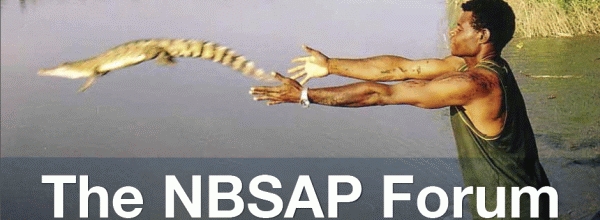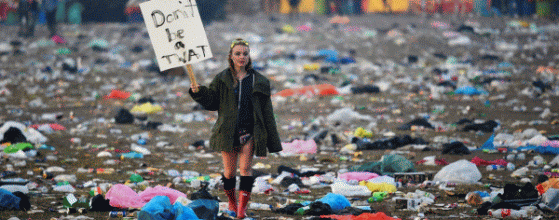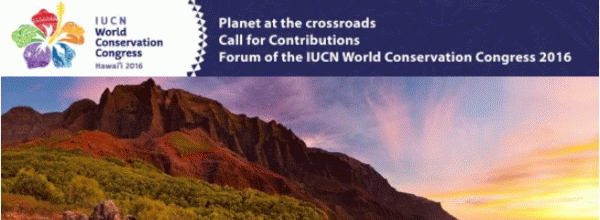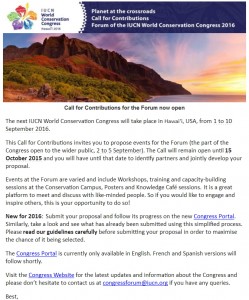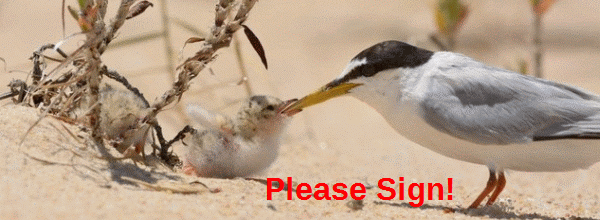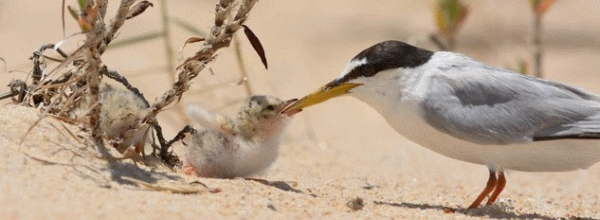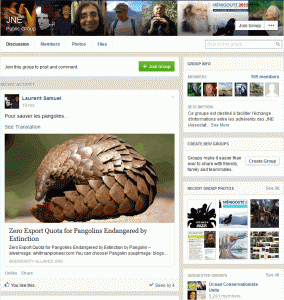:
Nuno Alves: Environment & Me - EEA
Summary
Below I scratch the surface of the EU Commission’s public survey on Natura 2000 Habitats and Bird directives, and uncover several substantial weaknesses of the EU Commission’s public survey with examples and make the case for withdrawing the survey and rework it extensively to make compliant with survey crafting general principles and make it usable for further improving conservation capabilities of the EU and its member states. Finally I highlight the potential connection with this case and TTIP objectives.
Introduction
The topic is not new, you most probably have read about it on The Guardian, on LinkedIn, on WLT or on Euractive. There are several aspects though which have not been mentioned so far, at least not on these portals, and which I found important to highlight.
First of all please visit Birdlife International’s Naturealert campaign, where you can support protecting Natura 2000 directives, currently under investigation by EU Commission and EU’s REFIT program, by participating in the public survey of the EU Commission.
After this you might find it surprising that below I will reason that the best way towards strengthening the EU’s nature conservation ability would be to stop the current process, revoke and substantially rework the survey, and launch it again only if and when it can truly be used for serving the objectives of conservation. If you agree please sign our petition!
EU Commission statements
First let me cite few quotes from Arthur Neslen’s post and realize that the process we are seeing might not be transparent enough.
As Mr. Enrico Brivio, a spokesman of the environment commissioner Karmenu Vella put it “They [the Natura2000 directives] ain’t broke but they are a bit old.”
Probably being a directive a bit old is not a proper reason itself to modify it. Especially if we are talking about scientifically prepared and founded, decades old, matured instrument for conservation.
More importantly “EU’s president Jean Claude Juncker instructed Vella to “overhaul the existing environmental legislative framework to make it fit for purpose.”
The question is for what purpose Mr. Juncker meant? The purpose of nature conservation, the purpose of business, or the purpose of something else?
On what ground Mr. Juncker arrived to the implied conclusion that the existing framework does NOT fit for that purpose? What are the real reasons behind his order? Has Mr. Juncker received any requests to modify the directives? If so, from where? From conservationits or from the business who might face with inconveniences caused by conservation related directives?
The announced objective of the revision which is “The idea is to reduce certain administrative burdens without compromising the directives’ main purpose.” is quite alarming.
Which administrative burdens need to be reduced? Who’s interest is to reduce these burdens?
The interest of decades long nature conservation in the EU needs clear facts on the table to see what is going on and why.
The Nature Conservation Commission of the EU
Now take a minute to meet the EU Conservation Commission behind and backing this process.
The EU Commissioner is Mr. Karmenu Vella, his profiles are available to visit on wikipedia, on the EU Commission website, his own website or on LinkedIn.
Among the positions held by Mr. Vella throughout his career the one which probably the most strongly related to conservation was, when he served as Minster for Tourism in Maltese government. This is how Mr. Vella spoke about it on his EU Commission hearings: “Most recently, as Minister for Tourism in Malta, I was responsible for the country’s most important economic sector, a multifaceted industry that required me to engage and cooperate with the full range of stakeholders.” Tourism and nature conservation are, in the majority of cases, do not walk hand in hand.
Does Mr. Vella, for example has ever made an attempt to stop the traditional spring hunting of wild birds, especially swallows, in Malta? Or did this hunting some contribution to tourism? The Gurdaian posted an article about a campaign led by conservationists to halt stop this tradition not too long ago. I couldn’t find information about Mr. Vella’s effort against it in any of his above mentioned profiles.
Mr. Vella is supported by his team.
The spokesman, Mr. Enrico Brivio’s profile is available on the EU Commission website and on LinkedIn for example.
The public survey questions
Let’s observe the public survey itself crafted and conducted by Mr. Vella and his team. As an example I pick three questions of the survey to observe several deficiencies of them. Next to each question the predefined answer set can be seen.
Q6. Have the Directives been effective in protecting nature?
- not effective
- somewhat effective
- effective
- very effective
- I don’t know
Q7. How important is the Natura 2000 network for protecting threatened species and habitats in the EU?
The Natura 2000 network comprises some 27,000 protected areas with a high biodiversity value covering approximately 18% of the EU and over 4% of its seas.
- not important
- somewhat important
- important
- very important
- I don’t know
Q8. How do the costs of implementing the Birds and Habitats Directives compare with the benefits from their implementation?
- The implementation costs are more or less equal to the benefits
- The implementationcosts are somewhat greater than the benefits
- The benefits of implementation are somewhat greater than the costs
- The implementation costs far exceed the benefits
- The benefits of implementation far exceed the costs
- I don’t know
I can observe the following with regard to these questions ambiguity:
Q6: The definition of the term “effective” is not provided. Effective in terms of what? Financially? From the viewpoint of the number of saved or protected species? Or business-wise? Should it be considered local, national or EU level?
Q7: The background information required to judge the importance of Natura 2000 network is not provided. The survey taker has no chance to understand the importance of Natura 2000 without knowing other protective measures, if any at all, including their characteristics.
Q8: In order to pick the proper answer the survey taker should possess the knowledge of a) the costs of implementation of the directives; b) the benefits from their implementation converted to financial terms, though I doubt if there is a single person on Earth who knows this; c)whether or not these two measures are to be considered on local, regional, national or continental level, d) if their aggregated or average (per species, per area, per inhabitant) value should be taken into consideration.
Vast majority of the other questions suffer from similar deficiencies.
Survey result usability
Now let’s just observe a hypothetical result set of say Q6, and lets pretend that the survey will end up with the following data:
Q6. Have the Directives been effective in protecting nature?
- not effective: 11%
- somewhat effective: 19%
- effective: 27%
- very effective: 21%
- I don’t know: 22%
So than what?
What conclusion can be drawn from such an (hypothetical) result? Will the Commission end up by saying that the directives are good enough, because according to 48% of the answers they were effective or very effective? Or will they say the opposite, that the directives need to be changed because 52% of the answers does not classify them as effective or very effective?
General survey considerations
Observing these questions from the viewpoint of general principles of scientific survey making, I can arrive to the following conclusions:
Survey makers should always bear in mind that with inappropriately designed survey, like this one, they would compromise not only the quality of collected data but also the efforts of all those individuals and organizations who would participate in the survey. This is the most fundamental ethical principle of survey making. It has been breached.
One main principle of data collection is “Garbage in – garbage out” meaning that if the data being collected is unusable – i.e. the questions and the answer sets are wrongly designed – the result of the survey will necessarily be unusable as well. This principle was not taken into consideration.
The hypothesis which is aimed to be proved or to be denied by the survey is at best, not clear, or there is none at all. So one can even suspect that the data, being ambiguous enough, could be used to support a variety of objectives, not necessarily those ones which are favorable from conservation viewpoint.
Generally the following questions also can also be asked:
Who designed, verified and approved the survey so that it has been made without considering a numerous quality standards?
Who can use such data resulting from this survey?
What such ambiguous data can be used for?
Are there any thresholds defined already to make judgments based on resulting data?
Are these thresholds public?
At the EU Commission hearings Mr. Vella stated that “I will … seeking always to ensure broad consultation and presenting sound data to support the conclusion.” The Natura 2000 public consultation survey does not seem to support this commitment.
Furthermore, it is widely know that effectiveness of any regulation is assessable only together with its enforcement efficiency. Therefore the investigation of the directives themselves without investigating the enforcement system behind the directives does not make sense.
I would like to believe that the obvious deficiencies of this survey were the result of flurry and were not made by purpose. Still the survey seems to be unsuitable for appropriately collecting data usable for truly supporting the interest of nature, species and habitat protection.
Final observations
The timing and the defective implementation of the survey seems to be even more strange in the light of the fact the study titled “State of the nature in the EU” by the European Environment Agency published on 20th May 2015, quite soon after launching the public survey.
Could it be that Mr. Vella and his team were not aware of that such study will be published?
What is the point of conducting a survey suffering from all the above mentioned deficiencies while there is one, which has been prepared and crafted by scientific preciseness, based on validated and analyzed data collected through many years?
Can it be that the survey launched by Mr. Vella’s team is aiming to weakening the key message of the study, which is “When implemented well, conservation measures work and improve the status of habitats and species on the ground. Such improvements remain limited and patchy, and unfortunately Europe’s biodiversity is still being eroded overall and the pressures continue.”
So it says that the directives can work effectively but their enforcement has to be strengthened and the habitats involved has to be extended.
Having all that said I return to the bird-eyes view of this survey, and I agree with Ms. Jennings’ view from Birdlife: “This review is clearly part of a wider ideological deregulation agenda that is going on,”
And that is the point where this subject becomes much more worrying to me. The information available to the public about the Transatlantic Trade and Investment Partnership, and the efforts of the groups behind that agenda, underline that global business power seek for deregulated environment, in which regulations if any, are managed on country level. That would allow them to override country level regulations quite easily based on the planned Investor State Dispute Settlement (ISDS). You can find more info about it and its relation to TTIP at the European Citizens’ Initiative campaign website.
If that happens nature protection, conservation, biodiversity and, at the end life of millions of creatures remain unguarded and unsheltered. And that we must not allow.
If you agree please share this post and sign our petition!

